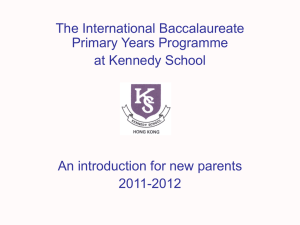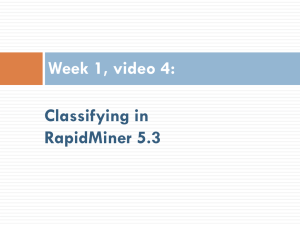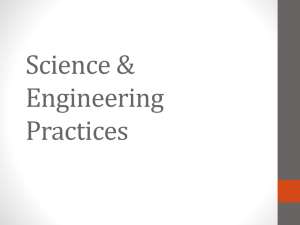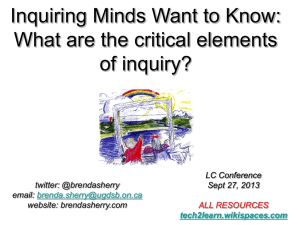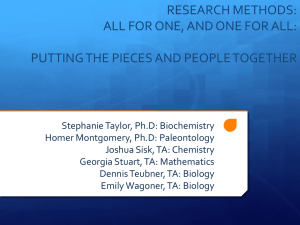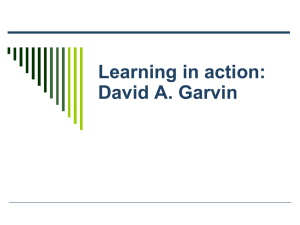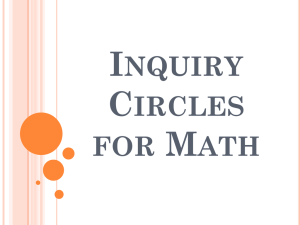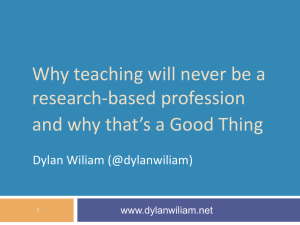Part 1 - Texas Association of Community Colleges
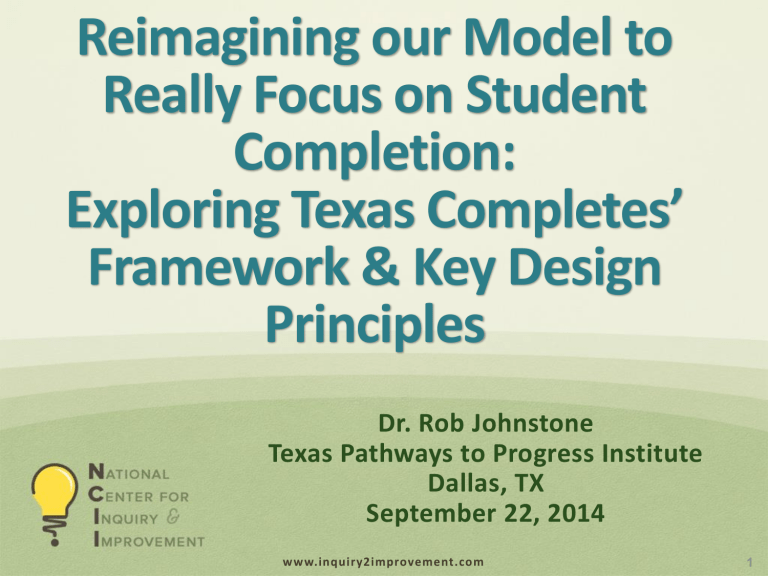
Reimagining our Model to
Really Focus on Student
Completion:
Exploring Texas Completes’
Framework & Key Design
Principles
Dr. Rob Johnstone
Texas Pathways to Progress Institute
Dallas, TX
September 22, 2014 www.inquiry2improvement.com
1
Acknowledgements
• The content in this presentation was primarily developed by
Dr. Davis Jenkins of the Community College Research Center &
Dr. Rob Johnstone of the National Center for Inquiry &
Improvement
• Other partners whose thought capital contributed to its development include:
The Bill & Melinda Gates Foundation
Completion by Design Assistance Team (CDAT)
Jobs for the Future (JFF)
Public Agenda
The RP Group
WestEd
National Center for Inquiry & Improvement www.inquiry2improvement.com
2
Agenda
• Demonstrate the problem: a student’s journey
• Visualize the Student Experience
• Discuss the context of completion
• Explore the Texas Completes Framework
• Engage with the Texas Completes Design principles
National Center for Inquiry & Improvement www.inquiry2improvement.com
Walking Through a Student’s
Exploratory Process:
A Website Journey
www.inquiry2improvement.com
Demonstration: A Student Interested in
Psychology
• Institution was selected at random
• If you think it’s different at your college / within your system, click on a couple of pages of your college’s website
• Yes this is the website and we have advising – but it’s still the primary source for most students – and the face of the college
• http://www.sc.edu/ - see appendix for screenshots www.inquiry2improvement.com
National Center for Inquiry & Improvement
Post-Mortem…
• Can’t stress this enough – this is but one example of hundreds at 2/4-year colleges…
• Also important to keep in mind that for CC students – this is a huge simplification over what they need to navigate, as the 4-year student has a single goal – graduating with a BA / BS…
• CC students have with the options of short term certificates, long term certificates, “terminal” AA degrees, transfer + AA degree, and transfer without AA degree all as options
National Center for Inquiry & Improvement www.inquiry2improvement.com
Student Experience of Transfer
Problems
• Confusion about programs, requirements
• Transfer credits count only as electives
• Many decide on majors too late
• Students take excess credits, lose time and money
Recurring
Themes
• Information inaccurate, inaccessible
• Well-meaning but overwhelmed advisors
• Dysfunctional communication within/ among 2- and 4-years
• Students blame themselves
The Student Experience
www.inquiry2improvement.com
National Center for Inquiry & Improvement www.inquiry2improvement.com
Redesign for Completion:
Overview & The Big Ideas
www.inquiry2improvement.com
A Brief Discussion on the
Completion Agenda
• National movement – White House, Aspen
Prize, American Association of Community
College’s Voluntary Framework for
Accountability, Complete College America,
Department of Education, IPEDS Access to
Success, Foundations (Gates, Lumina, Kresge)
• Often takes a less “complete” view of completion
• Need for nuanced view
National Center for Inquiry & Improvement www.inquiry2improvement.com
The Challenge of Completion
For Colleges:
• Financial
Under-resourced
Incentives aligned with access, not completion
• Innovations tend to be isolated
• Change is hard, even when the will is there
National Center for Inquiry & Improvement
For Students:
• Easy to enroll, easy to drop out
• Many enter without a clear plan, and are placed into developmental education
• Lack of confidence, financial resources and social capital www.inquiry2improvement.com
Redesign Systems & Practices for Student Success
• Analyze and understand the common barriers and momentum points that students experience
• Implement and integrate proven and promising practices to provide students with the quickest, straightest path to completion
• Use data & information to customize support, monitor progress, and provide feedback to students.
• Create the conditions for change by empowering interdisciplinary, cross-campus delegations of faculty, staff and administrators
• Build infrastructure for continuous improvement
National Center for Inquiry & Improvement www.inquiry2improvement.com
Status Quo Pathways
• Little upfront career and college planning
• Paths unclear, poorly aligned with end goals
• Too many choices; requirements confusing
• Developmental dead-end
• Students ’ progress not monitored
• Limited on-going feedback and support
• Poor alignment with hs and other feeders
Guided Pathways
Clear maps to end goals
Default plans tied to predictable schedules
“Exploratory” majors for undecided
Integrated academic support for program gatekeeper courses
Progress tracking, feedback and support
Bridges to college programs from high school, ABE and other feeders
Four Big Ideas for Redesign
1.
Structured Pathways / Programs of Study
2.
Better On-ramps into POS
Accelerated / co-curricular Dev Ed, First Year Experience
3.
Intentional Student Support Structures
Intake system, onboarding, advising
4.
Monitoring Progress / Customized Feedback
National Center for Inquiry & Improvement www.inquiry2improvement.com
Exploring the Texas Completes
Framework www.inquiry2improvement.com
Texas Completes Framework
National Center for Inquiry & Improvement www.inquiry2improvement.com
Discussion
What are some key loss points you have observed for your students at each stage?
What are some key momentum points that you have identified that accelerate progress and lead to higher outcomes?
National Center for Inquiry & Improvement www.inquiry2improvement.com
COMMUNITY COLLEGE RESEARCH CENTER
Connection/Entry: Findings
• Many students undecided
• Defaulted into “gen ed” (and thus “dev ed”)
• Dev ed students diverted, not building skills
• Many students drop out after 1-2 terms
• CTE program students older, clearer goals
• “Concentrators” more likely to complete
• Math & English 101 not only “gatekeepers”
COMMUNITY COLLEGE RESEARCH CENTER
Progress: Findings
• Students very confused by transfer process
• Many don’t follow “catalogue” curriculum
• Low rate of gen ed core completion
• Enrollment continuity may be as important as intensity
COMMUNITY COLLEGE RESEARCH CENTER
Completion: Findings
• Most transfer without associate degree
• Many graduates earn “excess” credits
• Many students “linger”
• Relatively few “stacking” credentials
Student Experience of Transfer
Problems
• Confusion about programs, requirements
• Transfer credits count only as electives
• Many decide on majors too late
• Students take excess credits, lose time and money
Recurring
Themes
• Information inaccurate, inaccessible
• Well-meaning but overwhelmed advisors
• Dysfunctional communication within/ among 2- and 4-years
• Students blame themselves


